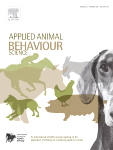Document type : article published in The Horse
Author: Christa Lesté-Lasserre
Preview: Researchers believe that nature sounds-such as running water, chirping birds, and a gentle breeze through tree leaves-might encourage horses to relax and chew forage. However, they might appear more frustrated than usual when listening to jazz music. Eleven years ago, British researchers found that horses in stalls seemed calmer when listening to country or classical music compared to jazz or rock. Today it seems there's perhaps an even better sound for stalled horses: the sounds of nature. (...) Bolanos, who works under the leadership of Amy McLean, PhD, presented at the 2024 19th Conference of the International Society for Equitation Science (ISES), held March 14-16 in Cambridge, New Zealand. Stalled horses often show signs of frustration, such as pawing or kicking, and some even express stereotypies-repetitive behaviors that don't seem to have a purpose-such as crib-biting, windsucking, or stall weaving, Bolanos said. Enriching the stall environment with objects such as mirrors, fixed brushes, and toys can help reduce frustration, she said, but so might various sounds. Bolanos and her fellow researchers tested the responses of six Warmblood horses to different kinds of prerecorded sounds: jazz, country, nature sounds, lullabies, and classical music. None of the recordings included singing or other vocals, and the team played the recordings and observed the horses for one hour twice a day for two weeks. (...) On average the horses showed frustration behaviors more than twice as often when listening to jazz compared to the first day of the study when they heard no recordings, said Bolanos. (...) During the jazz sessions the horses kicked more and were more aggressive with their neighbors, McLean added. Plus, the horses that cribbed did so more when jazz was playing. Even so, it's possible the horses were reacting to that specific jazz playlist, she explained. By contrast, when listening to nature sounds, the horses spent about 15% more time foraging than they did on Day 1, she said. Foraging time was about the same as Day 1 for all other sound treatments. In general, the horses showed far less frustration on the last day of the study-when no sound recordings were playing-than the first day of the study-which also involved no recordings. This suggests that two weeks of sound enrichment might be beneficial for the welfare of stalled horses, regardless of the sounds played. (...)






